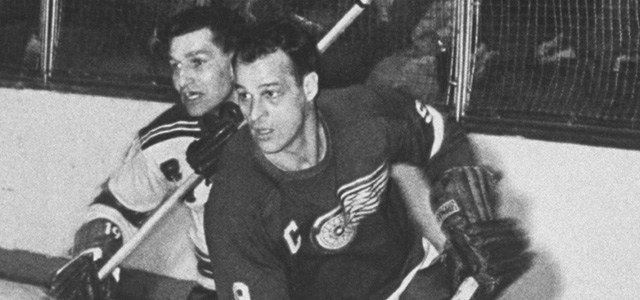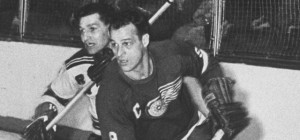Who’s the best Red Wing of all-time?: Gordie Howe
Gordie Howe has to be the greatest Detroit Red Wings player of all-time because he is the greatest NHL player of all-time.
There is ample testimony and evidence to support that verdict, starting with the fact that his nickname is Mr. Hockey. Going back to the 1940s, Howe’s name was synonymous with the Red Wings and the game of hockey. Undoubtedly many people in America in the 1940s, 1950s and 1960s didn’t know pucks from polka dots, but they could have told you that Gordie Howe was the league’s best player.
“If you equate greatness with superior play and durability, there is no match for Gordie Howe — I don‘t even think there is a challenger,” said former NHL and WHA coach Harry Neale, now a Buffalo Sabres’ broadcaster.
Scotty Bowman, the most accomplished coach in NHL history, also believes Howe is the best player he ever saw.
“When I think about players, I consider three ingredients: the head, heart and the feet,” Bowman said. “Some players don’t have any of those, and some players have one or two. But Gordie had all three in high dimensions.”
Hall of Famer Al Arbour said the most fascinating aspect of Howe’s dominance was his ability to make it seem effortless.
“It is like a great golfer,” Arbour said. “They swing so nice and easy and they make it seem so simple. You try to duplicate that swing and it’s impossible. No one could do it like Mr. Hockey. No matter what it was, he could do it well, whether it was penalty killing, power play or making passes.”
The golfing analogy is more interesting when you consider that Howe was known to grab any stick off the rack to score his goals. He wasn’t all that picky about his sticks.
Bowman said he doesn’t believe any player ever came close to matching Howe’s array of talents. “Gordie was the ultimate forward,” Bowman said. “He could play center. He could play wing and he could play defense.”
As much as the hockey world appreciates Wayne Gretzky, Mario Lemieux, Maurice “Rocket” Richard and Orr, Howe simply had more tools in his box. Gretzky was known for his creativity and passing, Lemieux for his goal scoring, Richard for his shot and Orr for his puck-moving ability. Howe was known for being the complete package. Coaches around the NHL viewed him as the perfect hockey player because there wasn’t a single aspect of the game he hadn’t mastered.
When Howe was playing in the World Hockey Association in the 1970s, his rival Bobby Hull said Howe “is still tougher than a night in jail.”
Newspaper accounts during Howe’s heyday provide testimony to the fact that he would sometimes play up to 45 minutes per game, and usually played 30 or more minutes. Bowman has said he believes Howe could have played all 60 minutes if a coach would have let him.
Bowman said the Montreal players viewed Howe “as being close to Superman.”
Supporting evidence for how remarkable Howe was during his career:
- Won six Hart trophies and six Art Ross trophies.
- Suffered a fractured skull and brain swelling during the 1950-51 playoffs, and then won the NHL scoring championship in 1951-52.
- Registered 103 points in the season when he turned 40 years old.
- Played in 29 All-Star games in 32 seasons of professional hockey.
- Scored his last NHL goal at age 52, now an age when you can have an AARP membership.
- In 1959, Howe fought and defeated New York Rangers forward Lou Fontinato, who was considered the NHL’s top fighter. Howe won the Hart Trophy that season. That would be like Hart Trophy winner Daniel Sedin recording a TKO over Anaheim’s George Parros.
- In the 1960s, it was estimated that Howe’s wrist shot was well over 100 mph.
- In 26 NHL seasons, he played almost 97% of his games during his career. From 1961 to 1970, he missed only two games, even though he played a ruthlessly rough style of play.
Neale, who coached Howe in New England, believes that the night Howe scored his 1,000th career goal against the World Hockey Association’s Birmingham Bulls, he was playing with a fractured hand. Even when he was 49, Howe wouldn’t take a day off. Neale recalls Howe’s hand looked like a gob of “swollen purplish” goo when he netted the historic goal.
Howe had special tricks and he used them all. He could shoot with either hand, and he would often switch just to confuse the goalie. He could bank pucks off Olympia Stadium boards and read the caroms like an expert pool player. Hall of Fame goalie Glenn Hall recalls that Howe would drive the net with his knee out to beat the defenseman, “and he could shoot with one hand if he needed to.”
He was always faster than he looked. “I watched a lot of good skaters try to catch him from behind and never do it,” Hall of Fame defenseman Bill Gadsby said.
Arbour said when a defender came to close to catching Howe “he would put it into the next gear.”
Howe also had a reputation for being able send an opponent flying without the victim knowing exactly what had happened to him.
“He lived up to his reputation of Mr. Elbows,” Backstrom said.
Howe is certainly one of the most popular athletes in Detroit’s history. His persona was enormous to the point that it was difficult not to view the Winged Wheel and Howe as being intertwined. From 1946 until 1971, Howe was essentially the face of the Red Wings
The establishment of the Red Wings’ reputation as a hockey superpower occurred during Howe’s watch.
Long before anyone had heard of Hockeytown, Howe made the Red Wings popular by helping them win Stanley Cup championships in 1950, 1952, 1954 and 1955.
Throughout his career, Howe had a reputation for signing autographs until his wrist cramped. Son Mark Howe recalls when he was young that he and his brother, Marty would start playing ball hockey in the Olympia corridor because they knew their father would be there an hour after the game. Howe would tell stories as he signed. It was almost as if he viewed his stardom as being community property that needed to be shared.
“He was the meanest, nastiest man on a pair of skates I’ve ever seen,” said his son, Mark. “Off the ice, he was the most gentlemanly man I ever met.”
To read Darren Eliot’s argument for Steve Yzerman, click here.
To read Michael Caples’ argument for Nicklas Lidstrom, click here.



Pingback:Who’s the best Red Wing of all-time?: Nicklas Lidstrom
Pingback:Who’s the Best Red Wing of All-Time?: Steve Yzerman